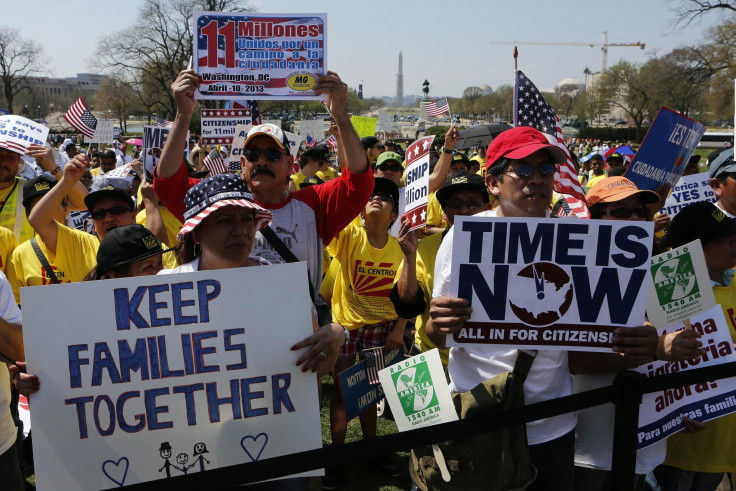Senate Passes 2013 Immigration Reform Bill, 68-32

The U.S. Senate set a major milestone Thursday when it passed its 2013 immigration reform bill by a 68-32 vote. If enacted, it will be the most significant immigration legislation in almost three decades.
“Unlike other countries, we are not afraid of people coming in here from other countries,” said Sen. Marco Rubio, R-Fla., a leading conservative and member of the “Gang of Eight” that drafted the measure, in a final speech before the vote. The Florida senator said he supports the reform not just because he believes in immigration, “but because I believe in America even more.”
The legislation, which includes more than 1,000 pages, was written by four Democratic and four Republican senators, who called themselves the “Gang of Eight.” America first got a glimpse of the comprehensive bill in April when the coalition unveiled it. The senators had spent months working on the framework of the package that would provide a 13-year pathway to citizenship for undocumented immigrants and enhance security on the southern border. It also raises the caps on entry of high-skilled workers and creates a new visa program for low-skilled "guest" workers. Moreover, E-verify -- a system that verifies whether a candidate for employment is in the country legally -- will be required for all businesses.
After more than 100 changes since the bill was made public, the “Gang of Eight” snagged a huge victory and overcame the first step in a process that would deliver a big win -- if it reaches his desk -- for President Barack Obama, who has placed immigration reform at the top of his second-term domestic agenda.
The final vote mirrored one taken earlier in the day where 14 Republicans helped Democrats cut off debate on the main bill, speeding up the process. But the move appears to have had no effect on House Republicans. That chamber is currently working on its own reform bill piece by piece.
“Apparently some haven’t gotten the message: the House is not going to take up and vote on whatever the Senate passes,” House Speaker John Boehner, R-Ohio, told CNN. “We’re going to do our own bill ... and move the legislation that reflects the will of our majority and the will of the American people.”
Getting to the final Senate vote on the comprehensive bill wasn't easy.
Senators initially couldn’t agree on a border security plan that would please conservative Republicans, and were at an impasse on the issue for much of the debate. That was until two Republicans -- Sens. John Hoeven of North Dakota and Bob Corker of Tennessee -- huddled together in early June with the bipartisan group of senators and hammered out a tough measure they described as an “overkill.” Money spoke as usual in Washington, and it took $30 billion allotted under Hoeven and Corker’s amendment to implement five "triggers" -- doubling the number of Border Patrol agents on the southern frontier to 40,000 and further militarizing said border with more drones, before green cards are issued to immigrants -- to move some conservatives off the fence.
Similarly, Democrats had to give in on issues such as legalizing same-sex binational couples. In May, Judiciary Committee Chairman Patrick Leahy, D-Vt., tried to push two amendments to allow the sponsorship of green cards for foreign-born gay spouses and to give legally married gay and lesbian couples the same protections as heterosexual couples. But Leahy had to pull back because of fears the measures would kill the bill. Rubio also suggested he would walk.
“It was not intended to cover everybody in every situation,” Rubio said on the “The Hugh Hewitt Show.” “You inject something like this in the bill it will die. The coalition behind it will fall apart and it will not pass. It’s just that simple.”
But Wednesday's decision from the U.S. Supreme Court overturning much of the 1996 Defense of Marriage Act mooted the issue, as it ruled that legally married same-sex couples should have the same rights as straight couples.
“The bill is the right thing to do from top to bottom,” said Sen. Chuck Schumer, D-N.Y., and a “Gang of Eight” member. He said a vote against the bill is like saying "it’s nice to help the economy but not if it helps immigrants."
The nonpartisan Congressional Budget Office issued a report last week that found the federal budget deficit will be reduced by nearly $1 trillion in the first 20 years should the bill be enacted. By the CBO’s count, federal revenue will increase by $459 billion in the first decade because of additional income and payroll tax collection.
“The only reason left to vote against this bill is the unstated reason -- opposition to the 11 million,” Schumer said, referring to the number of undocumented immigrants in the U.S. and urging his colleagues to find favor in the measure he spearheaded.
Some Republicans are still unhappy with the Senate measure. Sen. Chuck Grassley, R-Iowa, who was there for the 1986 legislation, said lawmakers “screwed up” back then by not securing the border. He added that senators are back in the same place more than 20 years later with the same problem and proposing the same solutions.
Grassley said a bill is needed that looks at internal enforcement.
“We haven’t been able to vote up or down on common sense amendments,” Grassley said, adding that hundreds of them were filed but only about a dozen were voted on.
“The bill won’t ensure that a future Congress isn’t back here 25 years dealing with the same problem,” he said. “We need a bill that ensures results. We need as bill that puts security before legalization, not the other way around.”
© Copyright IBTimes 2024. All rights reserved.












